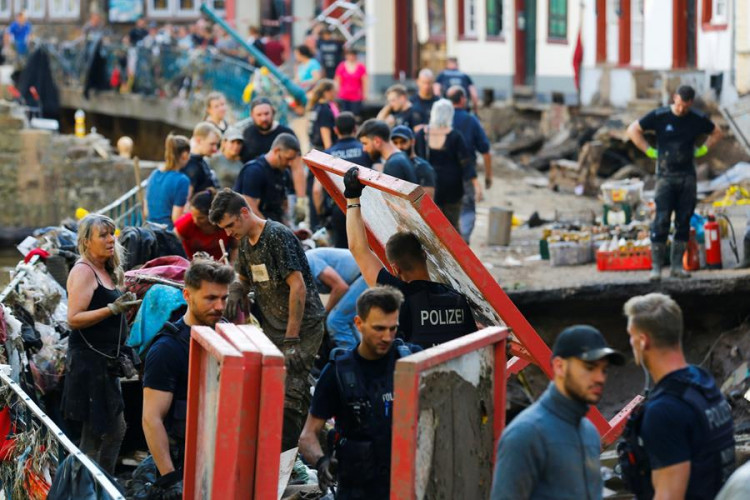German Chancellor Angela Merkel described the flooding that has devastated parts of Europe as "terrifying" after the death toll across the region climbed to 188, reports said.
Merkel promised immediate financial assistance after surveying one of the areas worst hit by the flooding that has killed at least 157 in Germany alone in recent days, in the country's worst calamity in nearly 60 years.
German Finance Minister Olaf Scholz said more than 300 million euros ($354 million) will be needed immediately.
"Thankfully, Germany is a country that can manage this financially," Merkel was quoted by The Associated Press as saying.
Days of incessant rain turned normally tranquil rivers and streets into wild torrents this week and triggered ravaging floods that swept away vehicles and engulfed homes and trapped residents.
Many people are still missing after record rainfall triggered severe floods in the Netherlands, Belgium and Germany. Authorities expect the number of deaths to increase further.
Latest on floods in Europe:
- Germany sees over 150 deaths, toll likely to rise
- Merkel: "I can almost say that the German language barely has words for the devastation that has been wreaked"
- Belgium fatalities reached 31, declares July 20 national day of mourning pic.twitter.com/eCc01oqeuK — CGTN (@CGTNOfficial) July 19, 2021
By far the biggest death toll was reported in the western German state of Rhine-Palatinate, where 110 people were killed, the Koblenz Police said in a statement Sunday.
Merkel said governments must accelerate efforts to tackle the effect of climate change days after Europe presented a series of measures for "net zero" emissions by the middle of the century.
"The German language can barely describe the devastation that has taken place. It is terrifying," Merkel told residents of Adenau, a small municipality in the state of Rhineland-Palatinate.
Pope Francis expressed his solidarity with the regions battered by the calamity.
"May the Lord welcome the deceased and comfort their loved ones, may he sustain the efforts of everyone who are helping those who have suffered serious damage," he said in quotes by CNN during an address in the Vatican, Sunday.
In the neighboring North Rhine-Westphalia state, Germany's most populous, 46 people died, including four members of the town's fire brigade. Local officials in Belgium confirmed 31 deaths.
Meanwhile, scientists say governments must both reduce carbon emissions that are fueling extreme events, and brace for more extreme weather patterns, BBC reported.






